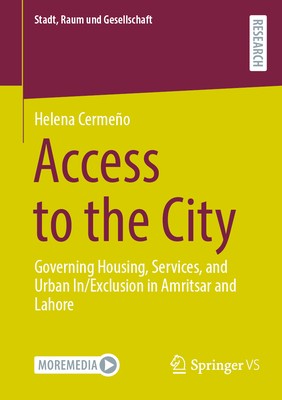
- We will send in 10–14 business days.
- Author: Helena Cermeño
- Publisher: Springer vs
- ISBN-10: 3658482273
- ISBN-13: 9783658482275
- Format: 14.8 x 21 x 1.9 cm, minkšti viršeliai
- Language: English
- SAVE -10% with code: EXTRA
Reviews
Description
This research focuses on Punjab, across the India-Pakistan border, specifically on the cities of Amritsar and Lahore. Their proximity, shared colonial past, socio-cultural ties, and entangled urban heritage offer a unique setting for comparative research on postcolonial urban governance and transformation. The book examines how governance practices shape urban dwellers' access to housing and services in specific neighbourhoods and contribute to the (re)production of socio-spatial in/exclusion. Rather than relying on a property rights lens, it adopts and expands Access Theory, conceptualising access as the ability to derive benefits from material, institutional, and symbolic resources. This lens foregrounds governance mechanisms and power relations that enable, control, and maintain access over time. Case studies in Amritsar and Lahore engage with theoretical mergers--such as access assemblages, evolutionary governance, and cityscapes--to explore neglected dimensions of urban processes, including human/non-human interfaces and socio-material infrastructures. By unraveling contestations over access, the research traces evolving governance arrangements and dependencies. While grounded in these two cities, the findings contribute to broader debates on postcolonial and South(east)ern urbanism, especially in border regions.
EXTRA 10 % discount with code: EXTRA
The promotion ends in 23d.13:22:58
The discount code is valid when purchasing from 10 €. Discounts do not stack.
- Author: Helena Cermeño
- Publisher: Springer vs
- ISBN-10: 3658482273
- ISBN-13: 9783658482275
- Format: 14.8 x 21 x 1.9 cm, minkšti viršeliai
- Language: English English
This research focuses on Punjab, across the India-Pakistan border, specifically on the cities of Amritsar and Lahore. Their proximity, shared colonial past, socio-cultural ties, and entangled urban heritage offer a unique setting for comparative research on postcolonial urban governance and transformation. The book examines how governance practices shape urban dwellers' access to housing and services in specific neighbourhoods and contribute to the (re)production of socio-spatial in/exclusion. Rather than relying on a property rights lens, it adopts and expands Access Theory, conceptualising access as the ability to derive benefits from material, institutional, and symbolic resources. This lens foregrounds governance mechanisms and power relations that enable, control, and maintain access over time. Case studies in Amritsar and Lahore engage with theoretical mergers--such as access assemblages, evolutionary governance, and cityscapes--to explore neglected dimensions of urban processes, including human/non-human interfaces and socio-material infrastructures. By unraveling contestations over access, the research traces evolving governance arrangements and dependencies. While grounded in these two cities, the findings contribute to broader debates on postcolonial and South(east)ern urbanism, especially in border regions.


Reviews